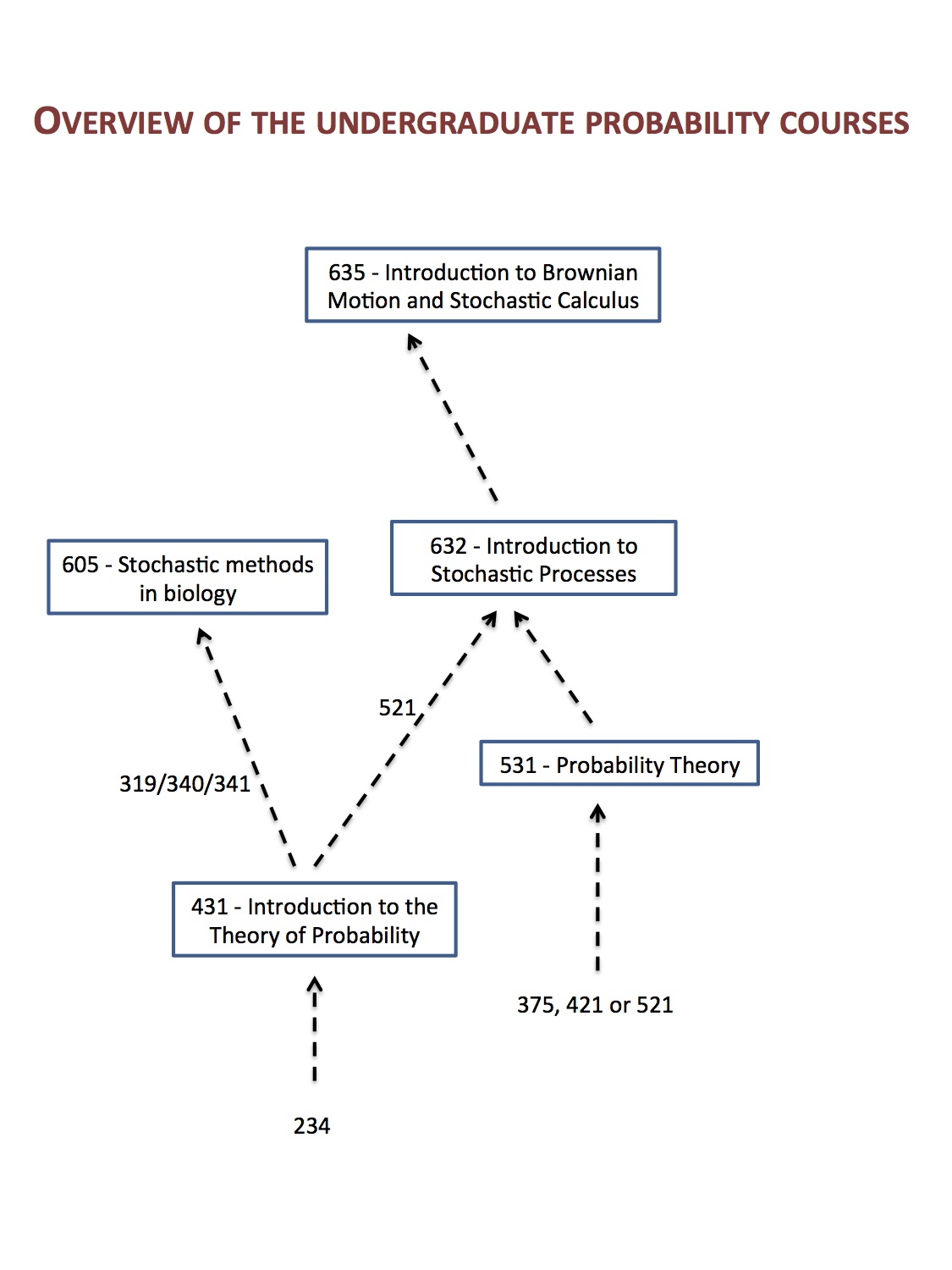Undergraduate courses in probability: Difference between revisions
No edit summary |
No edit summary |
||
| Line 42: | Line 42: | ||
''Prerequisite'': Math 521 and Math 632 | ''Prerequisite'': Math 521 and Math 632 | ||
File:Probability courses.jpg | |||
[[File:Probability courses.jpg]] | |||
Revision as of 18:23, 21 August 2014
431 - Introduction to the theory of probability
Math 431 is an introduction to probability theory, the part of mathematics that studies random phenomena. We model simple random experiments mathematically and learn techniques for studying these models. Topics covered include methods of counting (combinatorics), axioms of probability, random variables, the most important discrete and continuous probability distributions, expectations, moment generating functions, conditional probability and conditional expectations, multivariate distributions, Markov's and Chebyshev's inequalities, laws of large numbers, and the central limit theorem.
Probability theory is ubiquitous in natural science, social science and engineering, so this course can be valuable in conjunction with many different majors. 431 is not a course in statistics. Statistics is a discipline mainly concerned with analyzing and representing data. Probability theory forms the mathematical foundation of statistics, but the two disciplines are separate.
The course is offered every semester, including the summer.
Prerequisite: Math 234.
531 - Probability theory
The course is a rigorous introduction to probability theory on an advanced undergraduate level. Only a minimal amount of measure theory is used (in particular, Lebesgue integrals will not be needed). The course gives an introduction to the basics (Kolmogorov axioms, conditional probability and independence, random variables, expectation) and discusses some of the classical results of probability theory with proofs (DeMoivre-Laplace limit theorems, the study of simple random walk on Z, applications of generating functions).
This course is currently in development. The pilot version of the course will run in the Spring 2015 semester as 491a - Topics : Probability Theory.
Prerequisite: a proof based analysis course (Math 375, Math 421 or Math 521).
605 - Stochastic methods in biology
This course is, first and foremost, an introduction to stochastic processes (models that incorporate randomness) that is equivalent in level, and to a large extent content, to Math 632. However, the applications will be drawn primarily from the biosciences, with a special emphasis on the continuous time Markov chains used to model biochemical and other population processes. Further, as simulation is a large part of how scientists study their models, we will spend considerable time on these methods (such as the well known ``Gillespie Algorithm). Matlab will be the software package of choice for the course and each homework assignment will incorporate at least one Matlab exercise.
Prerequisite: Math 431, a basic knowledge of linear algebra and linear differential equations (e.g. Math 319, Math 340, Math 341)
632 - Introduction to stochastic processes
Math 632 gives an introduction to Markov chains and Markov processes with discrete state spaces and their applications. Particular models studied include birth-death chains, queuing models, random walks and branching processes. Selected topics from renewal theory, martingales, and Brownian motion are also included, but vary from semester to semester to meet the needs of different audiences.
Prerequisite: Math 431, a high level math course (e.g. Math 521)
635 - Introduction to Brownian motion and stochastic calculus
Math 635 is an introduction to Brownian motion and stochastic calculus without a measure theory prerequisite. Topics touched upon include sample path properties of Brownian motion, Itô stochastic integrals, Itô's formula, stochastic differential equations and their solutions. As an application we will discuss the Black-Scholes formula of mathematical finance.
The course is offered every two years in the spring semester.
Prerequisite: Math 521 and Math 632
